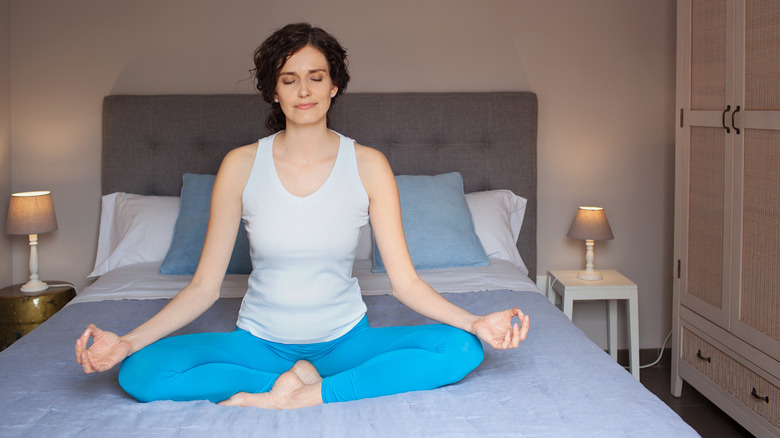What To Do About Annoying Night Sweats That Make Sleeping A Chore
Most people have overheated in bed at one point or another. All those toasty blankets combined with cozy pajamas, and possibly the body heat of a partner or pet, can force you to break a sweat while you sleep. A warm bedroom can also cause overheating. According to Sleep Foundation, people tend to sleep most comfortably when the thermostat is set to a cool temperature (around 65 degrees Fahrenheit, or 18.3 degrees Celsius, is generally considered the ideal).
Sometimes, however, middle-of-the-night sweats are a product of menopause, per Cleveland Clinic. Night sweats often go hand in hand with hot flashes, where the body quickly heats up before flooding the skin with perspiration to cool down. During night sweats, it's common to soak through your clothing and even your sheets.
Besides being uncomfortable — and creating a lot more dirty laundry than you'd probably like — night sweats can make it difficult to sleep well. A 2017 research review noted that women with moderate-to-severe hot flashes are nearly three times more likely to wake often in the middle of the night compared to women who don't have hot flashes. If excessive heat and sweating are keeping you from snoozing, follow these doctor-approved tips.
Healthy habits may keep night sweats under control
Night sweats can be a pain to deal with, but simple lifestyle changes may be enough to keep them at bay. First, follow the same steps you would if you were transitioning to the summer season — yes, even if it's still cold outside. Wear light pajamas, buy a cooling mattress pad and bedding, and keep the fan or air conditioner on in your bedroom. You can also keep ice water nearby to sip if you wake up feeling flushed.
It's also crucial to avoid hot flash triggers before bed. According to Healthline, these include smoking, caffeine, alcohol, and spicy foods. Stress is another common culprit, whether you're going through menopause or not. "When [the stress hormone] cortisol is elevated at night, it can lead to night sweats," says Dr. Julianne Arena, a double-board-certified physician and educator, told Everyday Health. Try stress-busting habits like meditating, exercising, and following a consistent bedtime routine, especially if you notice you're feeling extra frazzled.
Don't hesitate to see a doctor
If following a healthy lifestyle seems to do nothing for your night sweats, make an appointment to see your doctor. They may prescribe medication to help you catch more ZZZs, especially if your symptoms are caused by hormonal changes. "For menopause-related night sweats, hormone therapy is the go-to, because it replaces the waning estrogen," Dr. Lauren Streicher, founder and medical director of the Northwestern Medicine Center for Menopause and the Northwestern Medicine Center for Sexual Health, shared with Prevention. They may also suggest prescription sleep aids, non-hormonal medications, and over-the-counter supplements.
Talking to your doctor can also be a good idea to rule out other medical conditions that could be contributing to your night sweats. Though perimenopause and menopause are among the most common reasons for nighttime hot flashes, other hormone fluctuations, such as those that occur during pregnancy and menstruation, may trigger night sweats too. A range of other infections, sleep disorders, health conditions, and medications may also cause excessive sweating.
Even if your night sweats seem like nothing more than a nuisance, you deserve proper treatment. "A doctor can, and should, address the symptom regardless if the underlying cause is harmful (like cancer) or benign (such as menopause)," OB-GYN Dr. Sara Lillo explained to Health. With the right remedies, going to bed doesn't have to feel so stressful.


